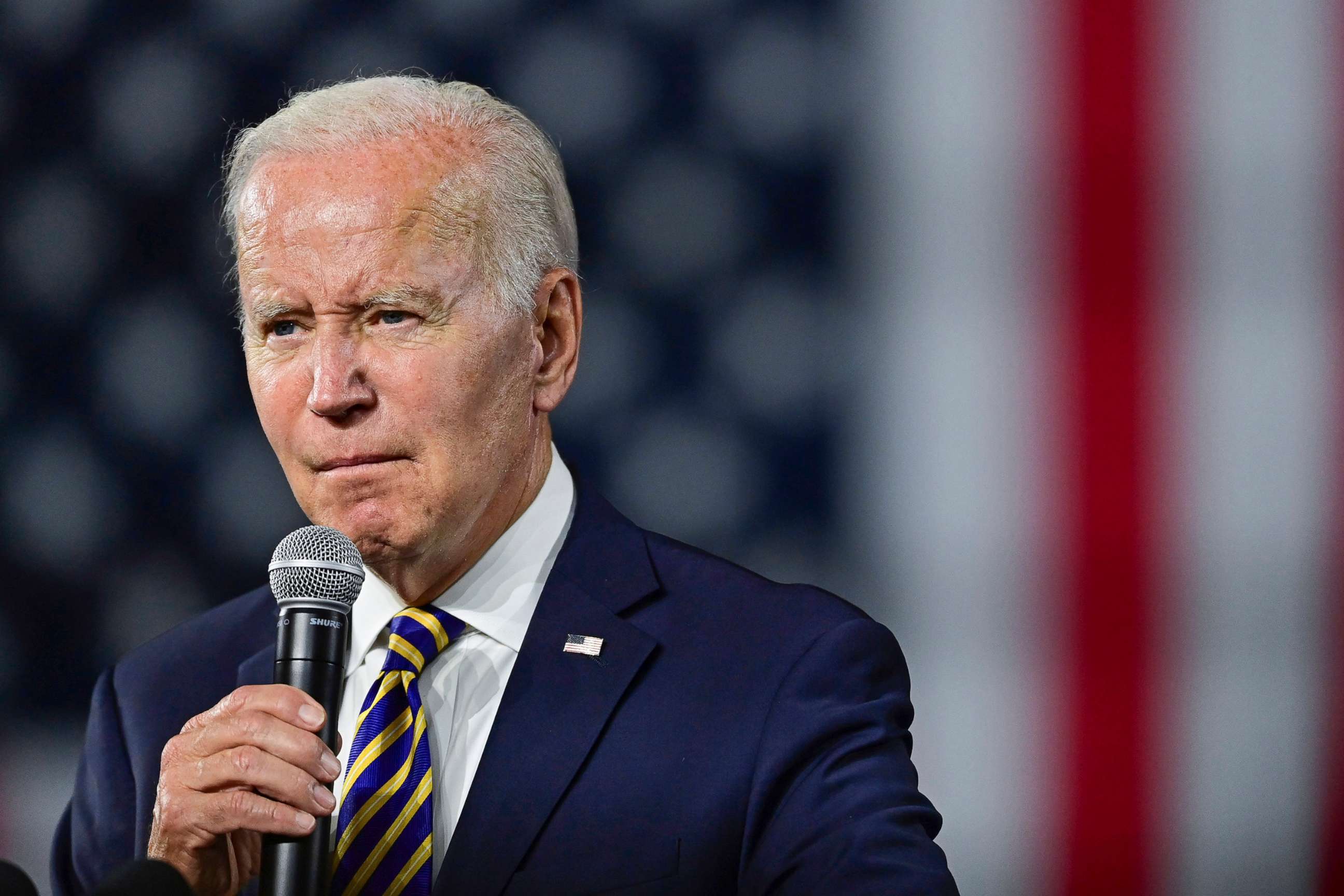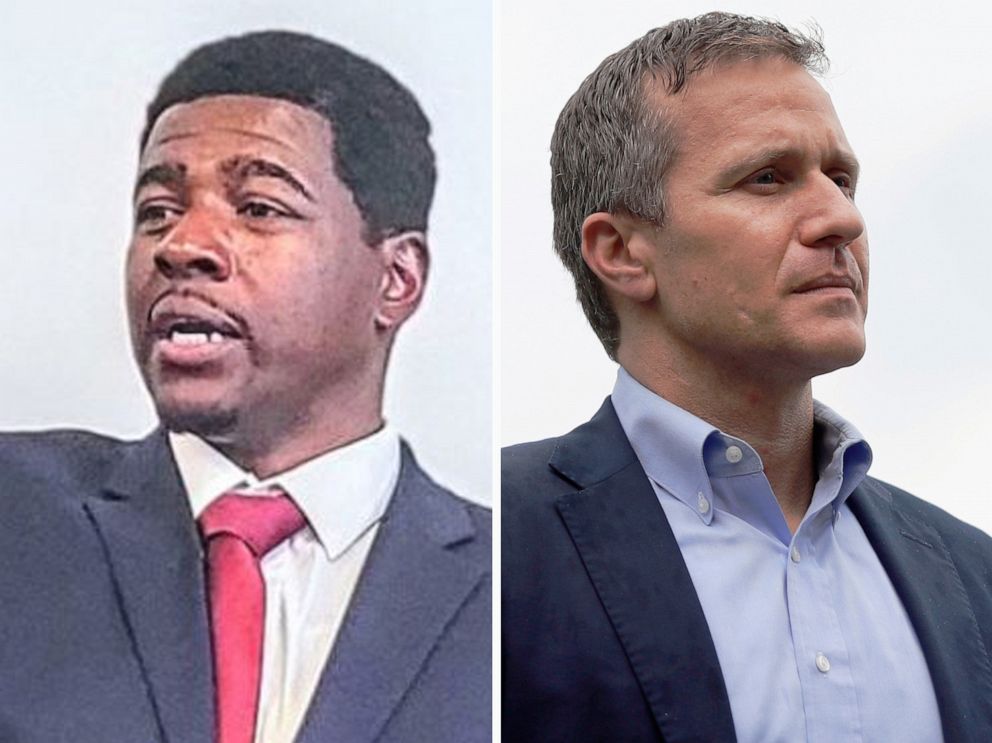Democrats' Biden problem takes over midterm messaging: The Note
Part of the president's failure looks to be an inability to unite his own party.
The TAKE with Rick Klein
It's coming from the left as well as the center -- from safe Democrats and those who are anything but.
It's coming from those who want more from the president and those who want less -- from loyalists as well as those who never saw much magic in the president's touch.
A week notable for the relative absence of Joe Biden from the national conversation has been filled, in part, by Democratic grumbling about the White House and about who could fill any perceived void.
Biden was in campaign mode in classic-battleground Ohio on Wednesday. He was there not to attack inflation or join the fight on abortion rights or gun control but to tout progress on protecting pension plans -- a vanishing benefit that's critical to labor unions but not many other core constituencies in 2022.
"I see you, I hear you and I'll always have your back," Biden told the labor-heavy crowd.
What he has been hearing back in Washington, on the day the White House announced that communications director Kate Bedingfield will be leaving her post, has been about terrible polling numbers and souring perceptions of his ability to turn things around for his party in the next four months.
That's been coupled with presidential buzz around Gov. J.B. Pritzker, D-Ill., and Gov. Gavin Newsom, D-Calif. -- blue-state leaders who are expected to have good reelection years in an environment from which not many in their shared party can expect the same.
Another Democratic governor has put Biden's White House in a different political bind. The office of Andy Beshear of Kentucky revealed this week that the president was poised to nominate to a federal judgeship a Republican who opposes abortion rights -- in what looks like a side deal cut with Senate Minority Leader Mitch McConnell, though no appointment has been made.
Biden on Wednesday bemoaned a failure to make substantial progress on his campaign vow to "unite the country." Part of his failure again looks to be an inability to unite his own party, at a tense time in the nation and a scary time for Democrats' prospects in the midterms.

The RUNDOWN with Averi Harper
The aftermath of the deadly shooting at a Fourth of July parade in Illinois has called further attention to the efficacy of so-called "red flag" laws.
The suspected shooter, despite what authorities have described as a disturbing history of threats to harm himself and others, was able to legally purchase the Smith and Wesson M&P 15 semi-automatic rifle that prosecutors allege he appears to have used to kill seven people and injure numerous others on Monday.
Conservative opponents of gun reforms point to the shooting in Highland Park as an example of ineffective restrictions. But proponents of such laws, like Connecticut Sen. Chris Murphy, say it is reason why the funding laid out in the recently passed gun bill is so important.
"The Illinois red flag law is hardly used. In fact, one single county, which made a commitment to learn it and implement it, accounts for 65% of state red flag orders," Murphy wrote on Twitter on Wednesday. "Our bill, passed two weeks ago, will send almost a billion dollars to states to improve their red flag laws."
The debate is unfolding as partisans go to their respective corners on the issue, as has become routine after the all-to-common occurrence of mass shootings. Sen. McConnell said he believes blame lay solely on "mental health," while Vice President Kamala Harris called on Congress, during a trip to Illinois, to "have the courage to act and renew the assault weapons ban."
Given the wide gulf between Republicans and Democrats on guns, the likelihood of a federal assault weapons ban is slim at best.

The TIP with Alisa Wiersema
Although the debate over gun laws is not a new issue for the campaign trail, recent national tensions appear to have opened the door for some GOP candidates to capitalize on the urgent topic through extreme rhetoric in campaign ads. Against the backdrop of national fallout over the Highland Park shooting, at least two politicians in states where tough midterm election battles are unfolding released visceral ads that prominently feature firearms.
"We're back. Everybody remembers when we first rolled on the scene. Well, I'm no career politician -- I'm a Navy Seal, and I'll take dead aim at politics as usual," Missouri Republican Senate candidate Eric Greitens said in his latest ad, in which he is seen firing at exploding targets.
"Everyone also remembers, because I fought for you, they came after me. We're back -- wiser, stronger, still fighting and this time with an army of patriots," Greitens declares in the ad, as two additional camouflaged and armed figures emerge into a march from behind him.
Greitens, who previously resigned as Missouri’s governor in a cloud of controversy, had faced backlash from some state and national Republicans over another campaign video which depicted him hunting "RINOs." The moniker refers to members of the GOP who are not seen as conservative enough and are thought to be "Republicans in name only" by some of their fellow party members. Facebook removed that video "for violating our policies prohibiting violence and incitement."
Meanwhile, in Arizona, Jerone Davison, a Republican candidate in the primary for the 4th Congressional District, released an ad showing a group of hooded klansmen charging toward a home before Davison emerges from the house armed with a gun and scares them away.
Davison is facing a crowded primary field of Republicans vying to unseat incumbent Democratic Rep. Greg Stanton in the newly redistricted area.
"Democrats like to say that no one needs an AR-15 for self-defense, that no one could possibly need all 30 rounds. But when this rifle is the only thing standing between your family and a dozen angry Democrats in Klan hoods, you just might need that semi-automatic and all 30 rounds," the former NFL running back says in the ad.
On Twitter, Davison defended the video, saying, "I was born in 1970 in Mississippi. When the KKK came to town, I always felt safe, because my father had rifles to protect us. This video is a cinematic depiction of a situation I faced growing up."

NUMBER OF THE DAY, powered by FiveThirtyEight
10. That's the number of congressional maps redistricting commissions enacted this cycle, but as FiveThirtyEight's Amelia Thomson-DeVeaux and Nathaniel Rakich write, that number could plummet if the Supreme Court decides to embrace an extreme legal theory that argues only state legislatures and Congress have the authority to decide how federal elections are run. Read more from Amelia and Nathaniel on how our elections could change from gerrymandering to election administration if the Supreme Court rules in favor of this theory.
THE PLAYLIST
ABC News' "Start Here" Podcast. "Start Here" begins Thursday morning with ABC's Josh Margolin on the Highland Park shooting. Investigators say they have a confession from their prime suspect. Then, ABC's Katherine Faulders breaks down upcoming key testimony before the House's Jan. 6 committee. And, ABC's Trevor Ault explains outcry from Detroit residents over what they say is the city overtaxing homeowners. http://apple.co/2HPocUL
WHAT YOU NEED TO KNOW TODAY
- President Biden will award the Medal of Freedom to 17 people at 2 p.m. ET, including Simone Biles, Gabby Giffords, Megan Rapinoe and Denzel Washington as well as the late Steve Jobs, Arizona Sen. John McCain and Richard Trumka, all of whom will be posthumously awarded.
Download the ABC News app and select "The Note" as an item of interest to receive the day's sharpest political analysis.
The Note is a daily ABC News feature that highlights the day's top stories in politics. Please check back on Friday for the latest.




